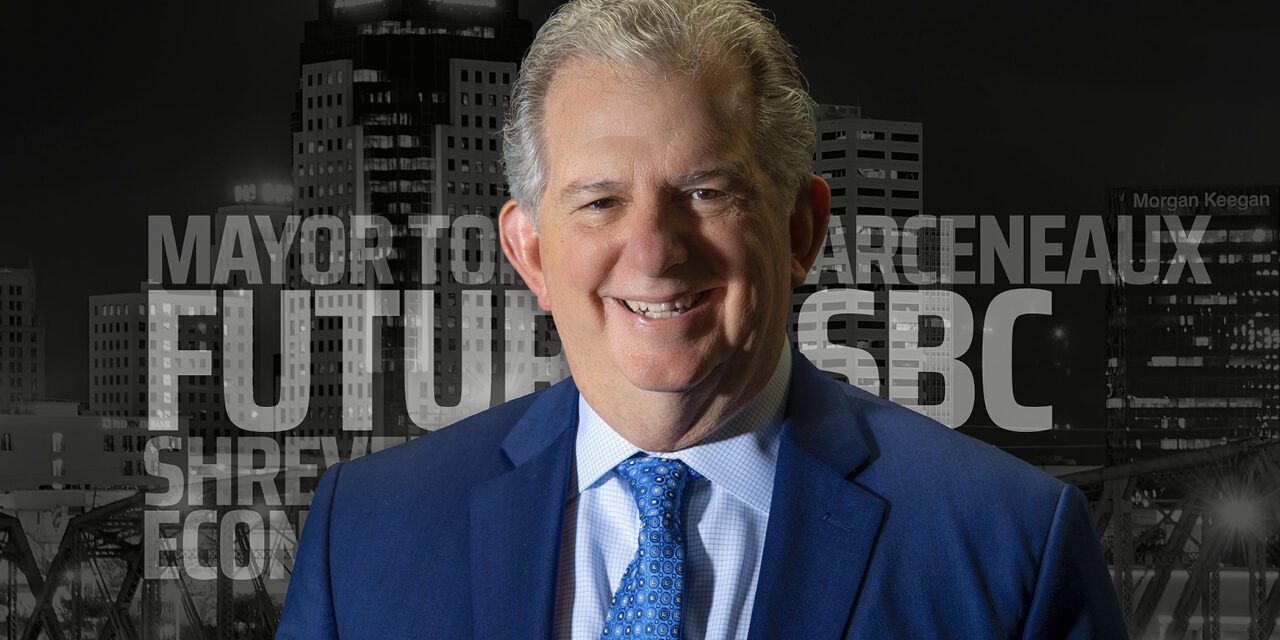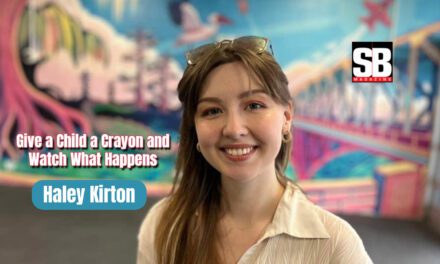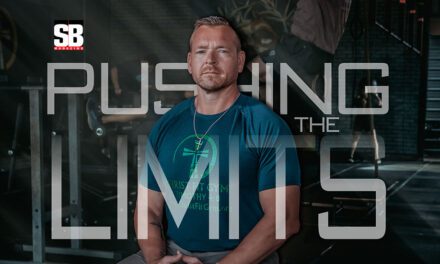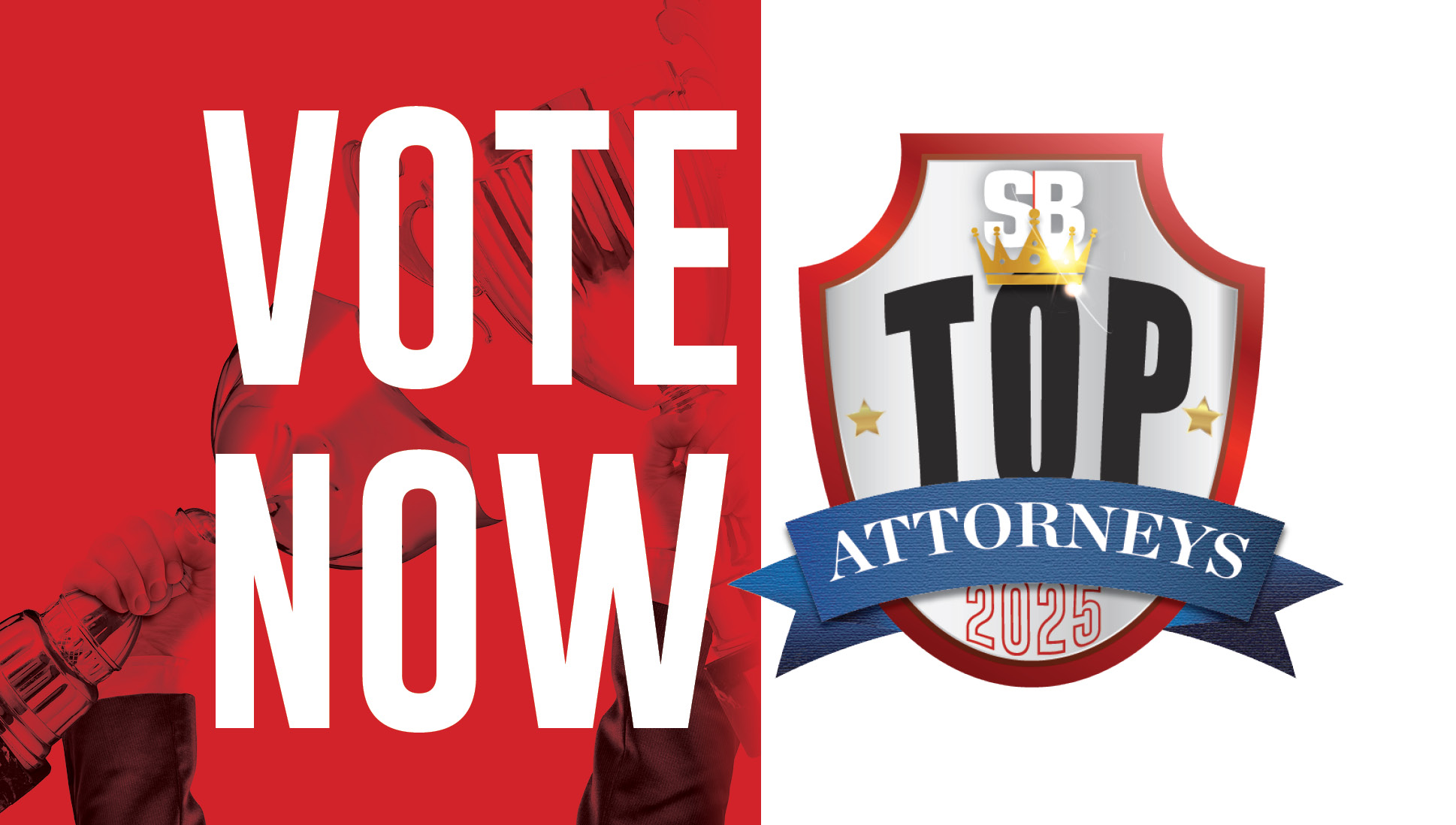BY ELIZABETH BEARD DEAL
“This is not about me. This is about the people of Shreveport you know. We have tonight looked beyond historical barriers and distinctions. We have a new future in the city of Shreveport. It will look different than it has looked in the past and that new future means that everyone has a seat at the table. It means that we build consensus, and it means that we will move forward together…This was not about winning an election. It never has been about winning an election. Winning an election is simply the first step that we have to take to get on with the work of making our city the great city that it can be. We can build a common future, a future that all of us can enjoy and appreciate and we can have a city that all of us can be proud to say, “I LOVE SHREVEPORT!”
Mayor Tom Arceneaux, excerpted from his election night speech
Local attorney Tom Arceneaux was elected as Mayor of Shreveport on December 10, 2022. Undeniably passionate about Shreveport, Mayor Arceneaux comes to the job with a selfless focus on building a better Shreveport. His campaign focused on the power of restoration, and he brings to the table exemplary leadership skills, work ethic, prior government experience, vision, wisdom, and a genuine caring for other people.
SB Magazine sat down with the new mayor to hear more of his thoughts about creating a new path forward.
Your campaign had a wide diverse group of people supporting you. How did you bring them all together?
We were we were intentional about making sure that we had representation in our volunteers and on our campaign leadership team from all parts of the city because the mayor has to represent all parts of the city. While walking door to door as Elizabeth and I did starting in April, you learn that most people want the same things, but they might express it differently. They want a safe neighborhood. They want to be able to raise their children. They want their children and grandchildren to be able to play in their neighborhood and to grow and to be prosperous adults. It doesn’t matter where you live. That’s what people want.
Different neighborhoods have different manifestations of issues. Sometimes you have to address those manifestations differently in different neighborhoods. There’s not a one size fits all solution. Unless you have a diverse group of people that are advising you and that are participating, you’re going to miss some of that by thinking this one solution is the solution for everybody.
A mayor is not a savior. A mayor is a facilitator of people learning how to make their community work. It’s the people who make it work, not the mayor. But the mayor has to create an atmosphere and an infrastructure that allows that to happen. That’s what I’m hoping to do, and that takes everybody in the community. You can’t just think ‘if I get this group of people then I win the race.’ When you do that, you’re alienating the other folks and you’ve created division rather than cooperation. So I hope that by listening to people that come from different neighborhoods and have different backgrounds we will learn a lot about each other, so that we may dispel some of the generalizations or assumptions that we make about people that have a different background from us—we’ll find out that we have a whole lot more in common than we have not in common.
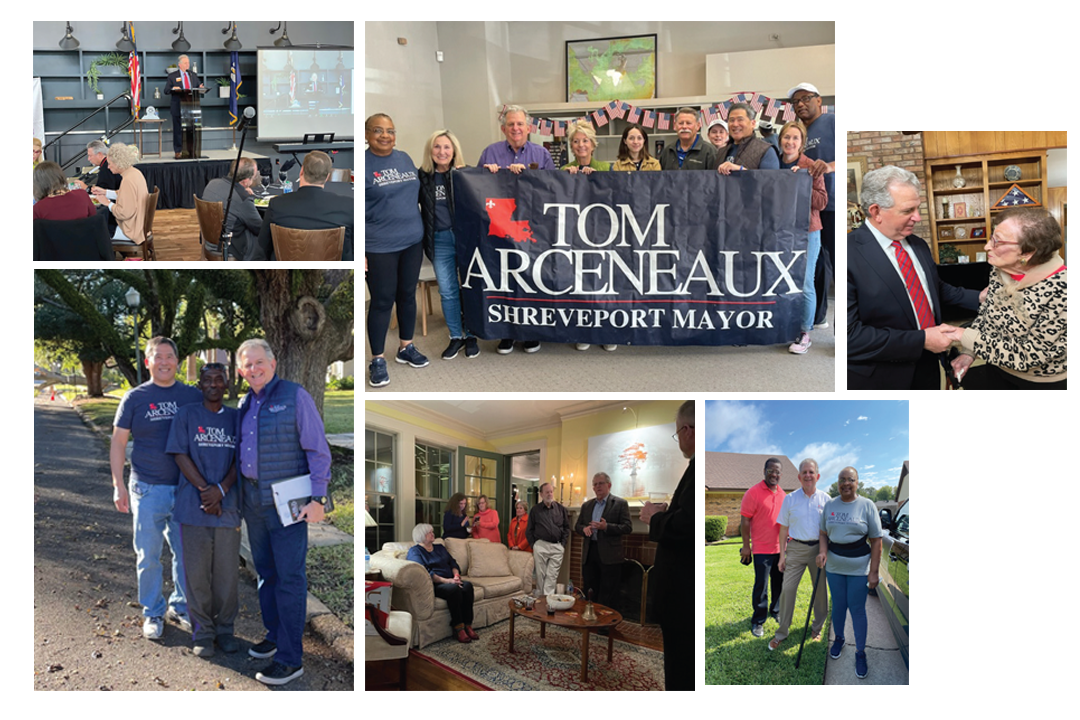
Why did you want to run for mayor and what are some of your plans for a new path forward?
I thought I had the unique set of skills and experience to do the work of putting us on a forward path, looking at difficult decisions and making recommendations about those decisions. I think we will face some very difficult decisions during my term. If I have not earned the trust of the people, by the time we have to make those decisions, they’ll be even harder because people won’t trust the government.
So the first thing I want to do is put together a team that the people will trust. Some of them are the same people that are there, but they’ll be under different and new leadership. Some will be new or former participants. I think the leadership will make a difference.
I think by and large, our city employees are competent, and they’re hard working. They haven’t necessarily been motivated, and I hope that I’ll be motivating for them. They’re going to see me a lot. They’re going to see me on the line. They’re going to see me when they’re picking up trash, they’re going to see me at roll calls. They’re going to see me so that I have the opportunity to tell them how much I and the people of Shreveport appreciate what they do. We can’t always give them the pay that they would like to have or that we would like to give them but what we can do is give them appreciation.
The second thing I think we need to do is to really look internally and say, ‘what are the things about my city that I can be proud of?’ We know the things about our city that we can’t be proud of, but every city has those problems or similar problems or a different set of problems. But we need to come together as a city and be proud of who we are/ Then the city needs to provide services that enhance that feeling that this is a really good place and people think, ‘I’m very glad I live here. Why don’t you come consider living here?’

What are the difficult decisions you anticipate?
I think that when we look at our operating budget long term, we’re going to find that in a handful of years, we’re likely to face some difficult financial decisions and the revenues that are going to come in are not going to be sufficient to fund the services that we have. We’ll need to be honest about those things.
I plan to develop a long-range outlook for our operating budget. We have a five-year capital plan. Capital plans are relatively easy to deal with because you have bonds that you’ve sold to fund those projects, and those have already been approved or they wouldn’t be in the plan, or you’re getting capital outlay money from the state or some money from the federal government. But when we’re picking up garbage and we’re having sports programs, other recreational programs, those things are funded by local taxes.
We ended last year I believe, with approximately a $30 million operating reserve. The budget for 2023 suggests that we’ll have a $20 million operating reserve at the end of 2023. Well, that means we’re budgeting to spend $10 million more than we’re taking in, right. If you have $20 million in reserves, you can only do that for two more years. And of course, you can’t completely do away with your operating reserve. So, we’re going to have to look at the ramifications of that and see what it is that we can do to address it.
And I think it’s very important to be completely transparent about finances to give the public information so that they can digest where we are and where it is that we’re likely going. We’ll have a picture of where we are today. What happens if we don’t change anything? And where will we be in two years, five years, 10 years so that people begin to understand. This is where we are headed. I mean, the numbers just tell the story. What will be our response to the story?
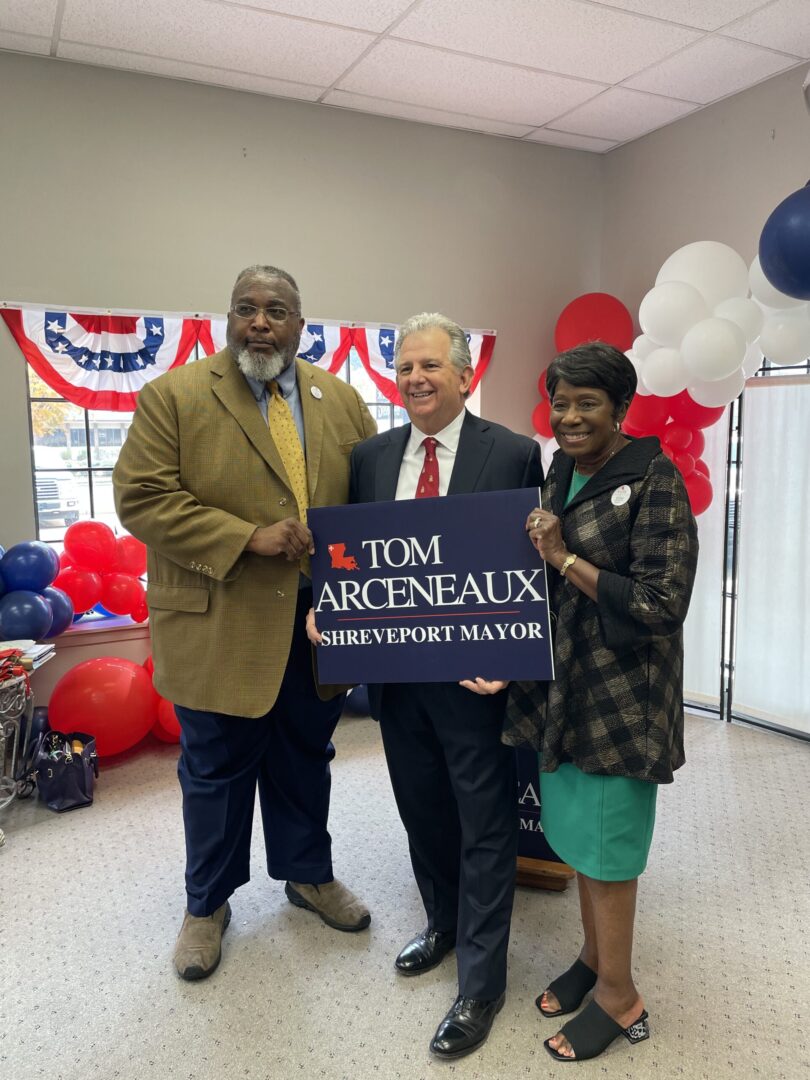
Maybe when we do long-range projections, they will show that we don’t have any problems at all. I suspect that won’t be the case. And so, we’ll have to decide how we’re going to get our garbage collected and how we’re going to maintain our streets, how we’re going to maintain our infrastructure. If it appears that we’re on a path that tells us we won’t have enough money to do the things that we’re currently doing, then then people will have to make choices based on those decisions. I’ll be making some decisions that I hope—if what I think it’s going to show—then I’ll have to make some budget decisions and respond to that as best we can in hopes that the people will see we really are doing the best we can with the tax dollars that they are giving us. And if we do that, then they can either support something else, or they can understand why it is that their level of service stays at a level that ordinarily they probably would not like to see.
What do you believe is a unique selling point for Shreveport?
I returned to Shreveport as a young lawyer because I felt like I could have a successful professional life and still have a place where I could spend time with my family and enjoy that aspect of life too. So now when I’m doing recruiting for the law firm, I always sell a ‘total quality of life.’ Starting salaries in Dallas or Houston are more than twice what we’re able to offer, so if you can’t compete on money, then then there has to be something other than money for the young people who you want to hire and I think that’s true for any business.
Shreveport has an amazing arts community. We have a really good symphony, we have an opera company, we have ballet, we have all kinds of live music, we have local artists, we have live theater. You can hardly go through a weekend without being able to go see high quality community theater and get to know the people who are doing it. There are musicals that you can afford to take your family to, and you don’t have to go out of town to do it. And if your child decides, ‘I might like to try this,’ there’s an avenue for the child to try that. That’s just not true in most communities. We have wonderful athletic facilities and teams but not every child is going to be an athlete, and so you need to have different ways that you can expose your children to other opportunities to develop themselves. Because they’re going to need to be productive adults.
And it’s so critical that we that we provide those opportunities and Shreveport has those opportunities. We need to enhance them so that not just the affluent have those opportunities, but children from all kinds of economic backgrounds are able to participate and grow and fulfill what I believe is God’s destiny for their lives.
What vision do you have for Shreveport?
I am an optimist by nature. I believe in Shreveport, I believe in the people of Shreveport, and I think when that shows, people will begin to believe in themselves and they’ll begin to believe in their hometown because we have many, many things to be proud of here. We’re strong arts community, we’re a good place to raise a family, we’re a place where young professionals can have a balanced life between their work and their family and their community efforts.
We have from my standpoint the best critical mass of young people that are here and want to contribute to the community that I’ve seen in my lifetime. That encourages me. People who are 25 to 45 have decided to come to Shreveport and have decided, ‘I’m gonna come to Shreveport and I’m going to contribute’ and we need to give that group of people the opportunity to contribute and learn. We need to use their idealism. We need to temper it with a bit of experience and wisdom. And then we can move our city forward because we’re quickly coming upon a time when we need to pass the torch from one generation to the next.
My job is to have the city ready to pass that torch. So one of the things that I’m trying to do is to have a succession plan, from generation to generation to hand down the good things that we know to the next generation of Shreveport leaders and moms and dads and business people and professional people. And if we do that, then our city is going to mushroom because we’re going to enable all of that energy to manifest itself in a great city with great people and you can say, ‘You know I I’ve made really good friends here.’
What makes a community is the opportunity to have friends. It’s nice to have places to party but when it gets down to it, the reason you party is because you’re trying to be with your friends. So, if you have a city that has the atmosphere of creating friendships and relationships then you can have a successful city.
What are your plans for the transition team committees?
I’m envisioning those lasting for 60 to 90 days, for some assessment and to help me further plan. I have ideas about what to do about violent crime. I have ideas what to do about economic development. I have ideas what to do about blight. I have ideas of what to do to bring communities together. I have an idea of where our finances are going. Those are the five groups. But we need hard data on that.
I also want to get some additional community input to finalize a plan. But in the meantime, I’m going to be acting. There are several pieces of legislation that we’ll be moving forward with early on in the term to set the stage for those other things, so it’s not wait and see what these groups come up with, it’s wait and see what else they come up with. I think it’s important that we show immediate progress on cleaning up the city, on addressing violent crime and on figuring out how to use every tool that’s available to us to eliminate blight in our city. I already know some of the steps that I want to take, and we will be taking those steps right away.
TRANSITION TEAM COMMITTEES
Administrative Transition Committee
Chair Tom Dark, William C. Bradford, Jr., Arthur Thompson, Sherricka Fields-Jones, John Nickelson.
Public Safety Transition Committee Chair Jim Roberts, William C. Bradford, Jr., Sarah Giglio, Bill Flanagan, Theron Jackson
Blight Abatement Transition Committee
Chair LeVette Fuller, Lydia Jackson, Tim Magner, Mike Moore, Hilary Wooley
Business and Economic Development Transition Committee
Chair Rich Lamb, Linda Biernacki, Dr. James Hobley, Taylor Jamison, Francesca
Moreland, Grant Nuckolls, Scott Ward
Community Building Transition Committee
Co-Chairs Wendell Delaney and Waynette Ballengee, Elizabeth Arceneaux, Gabriel
Balderas, Mario Chavez, Charles Johnson, Jimmy Jones, Camille Tharpe McCall, Havard Scott
Finance Transition Committee
Chair Robert Dean, Tom Dark, Brittney Dunn, Sherricka Fields-Jones, Bobby Jelks, Steve Walker
Photos courtesy of Tom Arceneaux for Shreveport Mayor Campaign.

